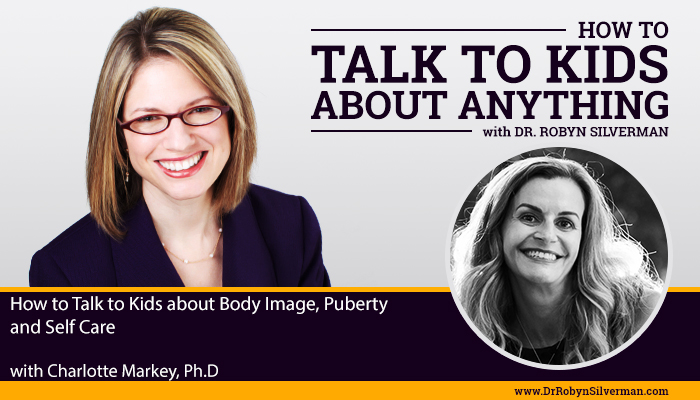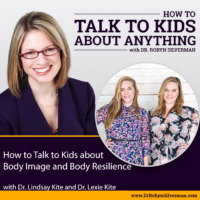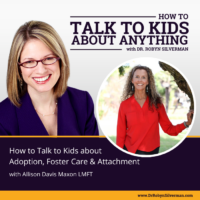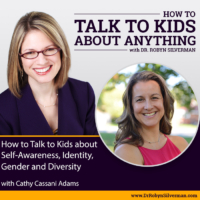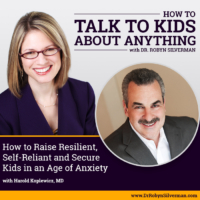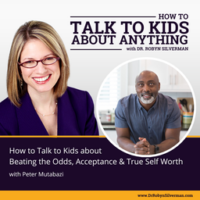Podcast: Play in new window | Download
Subscribe: Apple Podcasts | RSS | More
This podcast will focus on how to talk to kids about body image, puberty and self care. Myths about weight, size, puberty and bodies are highlighted and little conversations about these somewhat “uncomfortable” topics are explored. Dr. Robyn Silverman interviews Charlotte Markey, Ph.D, who wrote both The Body Image Book for Girls and The Body Image Book for Boys!
As children grow and enter their preteens and teens, they experience a lot of changes. Social changes, emotional changes, cognitive changes, and yes, physical changes as well. Many girls and boys feel dissatisfied with their bodies. Countless studies have shown that negative body image in girls has been linked with depression and eating disorders as they receive message after message that thinner is better and in fact, thinner is synonymous with being beautiful, well-liked, popular and good. Boys also are pressured to look a certain way—they get the message through toys, commercials, social media, TV and movies that “real men” are athletic and muscular. Perhaps it’s not surprising that a third of teen boys are trying to “bulk up” due to being dissatisfied with their bodies- and did you know that boys and men account for 25% of eating disorder cases? Talking about body image, nutrition, weight and the messages kids receive about their bodies is necessary to keep our children healthy, physically and mentally, as they grow and develop. Let’s discuss it! We have Charlotte Markey on today to talk about body image in both boys and girls!
Charlotte Markey, Ph.D., is a world-leading expert in body image research, having studied all things body image, eating behavior, and weight management for her entire adult life (about 25 years!). She is passionate about understanding what makes us feel good about our bodies and helping people to develop a healthy body image. Charlotte loves to share her body image wisdom with others, and is an experienced book author, blogger, and professor at Rutgers University, Camden. She currently lives in Pennsylvania with her son, Charlie, daughter, Grace, husband, Dan, and their dog, Lexi. For fun, she likes to run, travel, and read, but often spends her free time nagging her kids to brush their teeth or remove the cups and dishes from their rooms. Her book, The Body Image Book for Girls, is available now and her forthcoming book, The Being You: The Body Image Book for Boys will be available later on in 2022.
Important messages:
- Story: Charlotte was a dancer- 11 years old- great reviews on dancing- but told didn’t have a “dancer’s body” so not a contender for the “company.” Thinking something was wrong with her body. Wanted to be part of the solution.
- Body image: How we think and feel about our bodies. Bigger construct. Our body image impacts our behavior. Affects interpersonal relationships and our mental health. How do we feel about ourselves? If we don’t feel good about ourselves and our body- depression, eating disorders, anxiety. Comorbid with body dissatisfaction.
- Puberty: It’s important for kids to be prepared for puberty. Informed. When happen, not upset. Normal developmental experiences.
- News story on reproductive health. Resistant to talk about this. Why do we need to bring this up again? Lol. Just making it ok to talk about puberty and sexual health.
- A lot of little talks. Don’t lecture. Awkward. Embarrassed.
- “I noticed X looks a lot taller.”
- Doesn’t have to be a heavy thing.
- Puberty- affects body image at varying amounts. Boys- the body image isn’t as affected because the ideals of masculinity are tall and big and muscular and many boys are already going in that direction. The beauty ideals for girls- prepubescent. Opposite of the direction of puberty. Normal for girls to gain 25 pounds across puberty. Normalize that these changes happen. Not the same as when you gain weight when you are older. Sometimes they grow taller first then put on weight. Others put on weight and get wider and then grow taller. We don’t know how their adult bodies will look like. Likely full grown height by the time they are 13 or 14. Boys- they can still be growing in college. We don’t know the end game. The last thing we want to do is to say anything concerning to someone who already might be uncomfortable in their body.
- A lot of messages about “loving your body.” Strategies regarding embracing the body. Orient your child to the functionality of the body- what it can do- both boys and girls from a young age. (1) Talk about the cool things that our bodies do. Get through our lives. Turn food into fuel. Interested in Science? Take it to a medical/science place. Not just appearance. (2) And when physical- we appreciate body diversity. People look different. This is normal. Some weigh more, some less. (3) Change throughout lifetime. Sometimes weigh more, at times weigh less. This is normal. (4) Cultural misunderstanding. That we can control our weight. This is the message from the diet industry. Within a small range, we have some effect on our weight. Our weight is almost as genetically predetermined as height (and we don’t spend time telling people they should get taller).
- Body bullying: Natural impulse as parents “You look great! I love you just the way you are! You’re perfect!” Tells our kids that how they look matters. They know we are biased. Doesn’t make them feel better. Doesn’t mean we should never compliment. Not the last word. Dig in. Important time to ask questions. Not defensive emotional self. (1) Why do you think you need to lose weight? (2) How would your body be different if your body or appearance was different? (3) Do you agree with what X said about your body? (4) Practical- do you need new clothes that fit you comfortably? Sometimes that’s the issue! Your underwear are a size 6 and your age 12 now! This can help. (5) Do you want to talk to someone else about this? Ask more than once. If really upset. Sometimes they need it. Experts- therapists who do this for a living. Expert dieticians. Doesn’t mean that the child has a disorder to a problem. A few sessions can be transformative. Expert help before something becomes a problem.
- Myths- effects body image. Really hit home when they hear not true. Food myths. (1) Chocolate will make you break out (myth). (2) Carbs are bad for you (myth). Ubiquitous and wrong. (3) If a doctor is talking to you about your weight, it means you need to lose weight. Normal part of well visit. Need to make sure that they are growing. A young adult- my concerns started when the doctor told me what I weighed and told me that I should think to lose weight. Harm might not have been intended. From authority figure like a doctor- can be problematic. Get another opinion. Make sure you are talking to someone who really understands weight and body image- rather than a generalist. Many generalists don’t have training in nutrition and body image. Not just about these numbers- there’s a context for something like BMI!
- Body Mass Index (BMI) problematic indicator. Need other factors.
- If you look at someone who is quite thin vs someone is a more average American size 14. Can’t know who is healthier just by looking at them! Drink water, eat nutritious food, blow off stress in productive ways, get enough sleep, exercise daily. Can’t tell someone’s health status by looking at them!
- Don’t do this/do that:
- Don’t engage in a fad diet, just eat nutritious food most of the time.
- Don’t follow influencers on IG to motivate you to lose weight. Instead, follow body positive and mental health advocates on IG.
- Don’t avoid all fats in food instead enjoy them instead! We all need fats in food. Think about plant-based fats in food.
- Don’t body shame yourself to fit in- instead, change the subject, or, challenge. Don’t jump into the fat talk but rather, push back on it. No, I’m not going to do that! (Don’t pass the baton)
- Don’t compare your weight and size with friends, don’t talk about it with friends.
- Don’t skip sleep in favor of more screens, instead…we all need more sleep! Tweens need 8-10 hours. Teens need 8 hours.
- Fat talk: Relays bad messaging- Fat is bad. Gaining weight is bad. Losing weight is good. Dieting is good.
- A fraction of kids have eating disorders and a large number are eating in a disordered manner. Start when kids are young if you can. Avoid food rules.
- NOT: Good foods vs bad foods. “You have to eat this broccoli if you want to have this ice cream.” Don’t do that. Makes broccoli less desirable and ice cream more desirable. Offer foods that are nutritious but not make big deal about it. “Oh so healthy!” Shooting self in foot. Let it be. Respect own signals of hunger and satiety.
- We often express love by feeding them. We make a big deal about it. We can talk about food but don’t emphasize the wrong thing. Not so it’s a chore or hard.
- Dieting, restricting, regimented eating: What should we do or say? Age. Preadolescence. Actively trying to lose weight or “get shredded.” Conversation. “This is often counter productive. The end of every diet, the average number of pounds loss is 0 pounds.” Don’t want to deprive self of nutrition they need to grow.
- MYTH: Supplements. Protein powder. Unnecessary. Protein- adequate food supply gets enough. Too much- doesn’t help to build muscle. Another myth!
- Kids are trying to sort through their own identity and autonomy. Food can become a part of that. Don’t press too hard. Unless there is a major issue.
- Signs to look out for? Kids don’t want to eat whole categories of food. Dangerously unhealthy. Loses fair amount of weight in short time. Don’t mess around.
- Self careMODEL: “That run felt great.” “That salad tasted really good.” “It was so nice to be outside with friends.” Lot’s of little talks. Not big momentous talk. “After I go for a run, I find it rejuvenating to get in the shower after a run.” (Parenting out loud)
- If you need to be direct and say “you need to take a shower, you smell” if you have been gentle in many conversations before that, it’s ok.
- Sometimes explicit. “Sleep is really important.”
- Biggest mistake. Tricky territory. Overtly critical of the kids’ physical appearance. Often teasing. But devastating consequences. “My dad always said…” Family joke- but internalized.
- Name- “pudge.” Internalize. Divorce from body. Not intentional. Poking at gut. Having good intentions is not enough.
- Own awkwardness can influence our behavior. When kids are going through puberty. We do the wrong thing. Externalize our own adolescent angst.
- Top tip. Developing a positive body image is really central to developing positive mental health. Empower kids to push back. Foster media literacy. Want out kids to value themselves. They are so much more than their appearance. They can be part of the change in talking about this. Push back. Let’s not go there.
- Kids often want us to think they don’t care what we think. But research shows that they do.
Notable Quotables:
- “We often talk about body image as how we think and feel about our bodies. But it’s a bigger construct than that. Our body image affects our behavior…our interpersonal relationships and our mental health. So really, our body image is how we feel about ourselves. And when we don’t feel good about ourselves, the consequences can be pretty steep– depression, eating disorders, anxiety—are comorbid with body dissatisfaction.”
- “Kids should be somewhat prepared for puberty so that when these things happen, they don’t get upset about them. They appreciate that they are normal developmental experiences. In some cases, they may be kind of excited about this.”
- “Engage in a lot of little talks about puberty, sexual health, contraception. Don’t lecture. Because the kids do feel awkward and embarrassed. It doesn’t have to be a heavy thing. Sneak it in!”
- “The last thing we want to do is say something concerning to make them feel uncomfortable in a body that they might already feel uncomfortable about—we don’t want to compound the problem.”
- “There’s a cultural misunderstanding that is shoved down our throats by the diet industry and that’s the idea that we can completely control our weight if we are just disciplined enough. Within a small range, we have some effect on our weight, but our weight is almost as predetermined as our height—and we don’t spend time telling people to get taller!
- “The average amount of weight people lose at the end of a diet is zero pounds.”
- “Kids are trying to sort through their own identity and autonomy. Food can become part of that. We don’t want to press too hard. We want them to feel that they have some power to make decisions about what they put into their own body- that’s a normal thing to want to feel autonomy about- but if there’s a problem, intervene before it becomes a long, chronic problem.”
- “Being overtly critical of our child’s physical appearance, even in teasing, can be devastating to kids.”
- “Developing a positive body image is really central to developing positive mental health. We need to empower kids to push back.”

